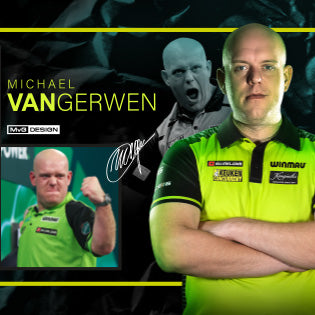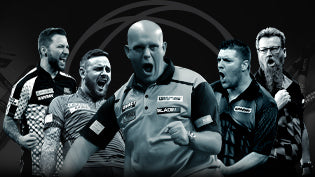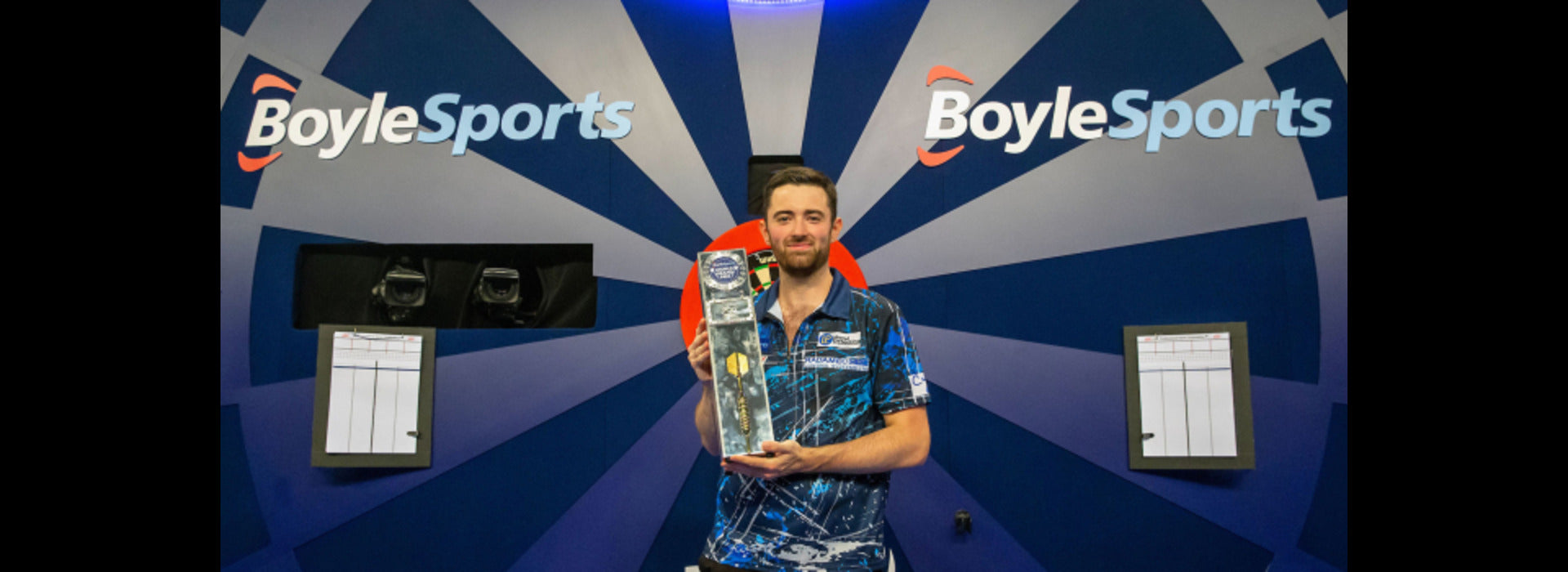
DR DARTS NEWSLETTER - PATRICK CHAPLIN - JULY'24 EDITION

In this article, I record one of the most important years and the most important events in the development of darts on television.
Up until 1972, apart from competitions transmitted by Westward TV and Tyne Tees Television, and the occasional odd adventure into pub/dart quizzes, television had ignored darts. One of the reasons for that was we in the UK had only three channels, BBC, BBC2 and ITV (the latter with its network of regional channels) who tended to ignore, overlook, or simply never consider darts.

In 2011 I interviewed the renowned commentator, Dave Lanning, (pictured below, left, attending an NDAGB event in 1976) about the 1972 News of the World finals, the first darts tournament broadcast ‘live’ on television. In that interview, Dave revealed to me the otherwise unknown fact that there was a ‘trial run’ of the commentary before the main event. He told me:
“I attended the Western Region Divisional Finals of the News of the World which were held a t the Civic Hall, [actually known as the St. George’s Hall] Exeter in March 1972. During the tournament I spoke my commentary into a tape recorder.
It had to be done sotto voce [in a whisper] because John Scrim [ITV Director, John Scriminger] and I were simply sitting about six rows from the front. Folk looked at us very suspiciously. In those days portable tape recorders were something out of James Bond.”

Many thanks to subscriber Chris Lovell who was able to tell me from his records that, in that Western Division, Cornwall’s Brian Netherton beat Somerset Area winner L. Cornall, playing out of the Rose Inn, Taunton, 2-1 in the quarter final, G. Murphy of the Greenmantle Club, Paignton, (South West Devon Area winner) in the semi-final 2-1, and R. Stocker, playing out of the Bell Inn, Leominster (the Herefordshire Area champion) 2-0. Chris also confirmed that the divisional final was held on Wednesday 29th March 1972.
The trial was clearly a success as plans were made for the televising of the 1972 final one month later. Dave’s lengthy career of commentating on darts had begun. Immediately after the ‘test,’ ITV’s World of Sport officially announced that, for the first time, they would be covering ‘live,’ the News of the World Grand Finals from Alexandra Palace. Dave wrote
‘It caused a fair bit of amusement in sporting circles and not inconsiderable cynicism among darting folk…But it was one of the most critical milestones in the development of darts.’
Looking forward to the 1972 Grand Finals, ‘The Champ’ announced in the News of the World programme:
Television, in the shape of London Weekend’s World of Sport programme, comes to the Grand Finals for the first time today [Saturday 29th April 1972] to add a new dimension to the biggest date in the darts calendar.’

Of the day, Dave recalled
‘When they opened the doors to the Main Hall about noon, the noise of 12,000 running feet was like approaching thunder, a stampede from an old John Wayne movie.
Some fans were humping firkins of their local brew under each arm. The continually noise and energy of the crowd stayed constant at one jot short of total hysteria. Fortunately, the TV soundmen were able to fade up the voiceback level so that I could hear the director and my own level above the local effects.’
The winner of the title was expected to be David (Alan) Evans. He was one, if not the best-known professional darts player in Britain at the time, playing out of his father’s pub, the Ferndale Hotel, Ferndale, in the Rhondda Valley. [The photo, above right, shows Alan being presented with the Wales Division trophy. (I do not have the name of the gentlemen, clearly a civic dignity, doing the presenting on that occasion. Evans signed the copy of the programme in my archive on the day. (See below) Please note that he has signed it ‘D. A. Evans,’ (David Alan Evans) although he would always in future be known simply as Alan.

Born 14th June 1949, Alan was described in the programme as ‘the Principalities outstanding darts player of 1972,’ adding ‘This young competitor is old in experience on the board.’
And, as the finals progressed, Evans was loudly urged on by his thousands of travelling fans, and, judging by the reaction of the crowd on the day, his favoritism was warranted.

In the quarter finals Evans met 21-year-old Mick Roper, the Midland Counties, divisional champion, (pictured on the left in the photo on the left. Image © News of the World. Used with permission.) Evans beat him 2-1.
(NOTE: One thing that was quirky about the News of the World competition at this time was that there were nine qualifying Divisional champions which meant that there had to be one match (ingeniously called ‘the first round’) where only two players played: the rest received ‘byes.’ Both Evans and Netherton had received ‘byes’ in the first round so automatically began their campaign at the quarterfinal stage.)
After beating Mick Roper, Alan went on to defeat the 1971 champion, the popular Londoner, Dennis Filkins. Once again, the London and Home Counties divisional champion, Filkins had been hoping to emanate Tom Barrett, as only the second man to retain the News of the World title

Dennis is pictured right with the London and Home Counties Divisional trophy which he won in 1971 and who went on to win the title that year. (Image © News of the World. Used with permission.)
Filkins lost to Evans, 2-1, in the semi-final at which point, according to Dave Lanning
‘Evans, emotional, spectacular, unpredictable, won the hearts of an armchair sporting public when, in the first major networked television coverage of darts in 1972, he beat reigning champion Dennis Filkins in the semi-finals of the News of the World championships at Alexandra Palace – and leapt about all over the stage like a kangaroo, bouncing around the stage in jubilation.’
Leighton Rees, recalled in 1979:
‘I was one of the 12,000 amiable inebriates in Alexandra Palace that day, supporting our Welsh boy, a kid from the next valley to me called Alan Evans, who overnight became ‘Mr. TV’ after literally bouncing across the Ally Pally stage after defeating the reigning champion, the late Derek Filkins, in his semi-final.
Later, in 1981, Deryk Brown wrote in his Guinness Book of Darts
‘Evans sparkled on his way to the final, even if his attempt to beat Filkins in the semi-finals with a second successive bull finish came unstuck.’
Evans versus Filkins must have been amazing to watch: a match which included a bull finish, and impressed everyone either at the Ally Pally in person or at home viewing the event. The TV moguls who were watching for the reactions and the ratings, were similarly impressed. But there were more surprises to come in the Final.

With the crowd noise in the Ally Pally reaching a crescendo, Evans stepped up on stage to meet his last opponent of the day, Brian Netherton, the Western Counties Divisional champion. Playing out of the Welcome Home Inn, Par, Cornwall, the programme said of Netherton
Cornishman Brian Netherton is aiming to take the trophy home to the West Country for the first time ever, and he could do it on his first attempt.
Although he has only been playing serious darts for the past four years, he won the West of England finals at Exeter at his first attempt. Thirty-year-old Brian…is certain of a big welcome in London.


While Evans was exciting the crowds, Netherton, who like seven other players also received a ‘bye’ in the first round, defeated Peter Crane, (below, left) the Eastern Divisional champion, 2-0 in the quarter finals and then 27-year-old bricklayer, John Walker (below, right, middle) (Yorkshire Divisional champion) 2-0 in the semi-finals without losing a leg.
Walker had worked a bit harder than others in the tournament as he was one of the two players who played in the First Round (the rest all having ‘byes’) against Scotland’s Barry Atkinson who Walker beat 2-0.
Now Netherton, the cool Cornishman, was stepping up to take on the strong favorite, Evans.
In the Final, in front of the ecstatic crowd and millions of fans watching on TV, Netherton took control and the Welsh dragon was vanquished. Netherton beat Evans 2-0 (Would you believe it?) on the bull!
Leighton Rees reflected in 1979:
‘He [Alan] was eventually beaten by the West Countryman Brian Netherton, which perhaps spoiled the fairy-tale ending for the telly boys because emotional Alan would surely have exploded if he had won the title that day.’
Thus, it was Brian Netherton who was not only the first Cornishman to win the News of the World but, more importantly, the first national winner ‘live’ on TV. History was made that day.
The response to darts ‘on the box’ was spectacular with over seven million viewers estimated to have tuned in and watched the event. It was one of ITV’s World of Sport’s largest audiences of 1972. Dave also accredited what followed, the massive growth of darts on TV, mainly due to the subsequent interest shown by the commercial TV channels something which ‘At the time, it seemed a glorious gamble.’
The Director of the ITV World of Sport darts broadcast was ‘a chubby, enthusiastic Welshman’ named Peter Jones. He was not the first choice, Scriminger who joined Dave Lanning for the ‘test’ in Exeter, had been but he had been unable to make it at the last minute. Thus, at the eleventh hour, the entire ITV network was searched for a replacement: a director with knowledge of darts.
Dave Lanning wrote that
‘Yorkshire TV sent down one of their top Outside Broadcast men…He [Jones] was so impressed with the spirit and success of the sport that he returned to Leeds and persuaded his programme executives to launch their own pub games programme, with darts as its cornerstone. Thus, later in 1972, The Indoor League was born.
[NOTE: Some time ago, I wrote an article about The Indoor League which I posted on my website. For this element of ‘Darts on TV’ please go to www.patrickchaplin.com/2019/08/31/the-indoor-league/ ]
NOTE: For all those of you who collect News of the World programmes and have a copy of the 1972 programme, it shows Bob McNab and Peter Marinello of Arsenal Football Club as presenting the prizes. However, Marinello was unable to make it, so his place was taken by his club colleague, Pat Rice.
FEEDBACK FROM PORTUGAL
David Mason from Porto, Portugal writes
Dear Patrick.
Thank you so much for June Darts History. Really loved the Sid Waddell story [an article aimed at the Japanese market] and it is wonderful that you have saved it for darts posterity. I probably like others have often wondered who started your research into darts and now we know.
Your Darts History is so unique and for us younger generation it is so great to read of the pioneers of the sport who started it all and which the generation of today have tagged onto and now so many are earning a living from the sport including players and officials. Thanks to those early pioneers of darts and hope they, like myself, pause and take a moment to say ‘Thank you.’
The 50th Anniversary of the Winmau World Masters is in August this year. My late father went to the inaugural event and said it was the beginning of the darts boom as we know it.
The history of the first world masters you wrote was absolutely brilliant and you wrote it so brilliantly it was really enjoyable to read. I do hope something is mentioned of this event in August to celebrate and share such a great event after 50 years. Do you think any of the first World Masters are still playing darts or even alive to remember the event as with the passage of time? They must all be getting into their late 70’s or even 80’s.
Dad said a true darts genius thought up the event that lasted so long in darts history. Not sure who founded the event and he may, like my father, sadly be no longer with us but I wish I could have been there at the first event in 1974 and been part of darts history like my father.

I replied to David
“As you said, I have written about the first Phonogram World Masters, (which became the WINMAU World Masters in 1976 after Phonogram withdrew their sponsorship) an article you will find if you visit my website at https://patrickchaplin.com/2019/05/22/winmau-masters-a-brief-history/
By the way, the 'genius' who thought up the World Masters format was Eddie Norman, at the time the manager of Leighton Rees, Alan Evans, and others. I am still in regular contact with Eddie.
Your father was absolutely right what he said about the Masters. It was trailblazing event which my wife Maureen and I attended as guests of WINMAU in the 1990s and early 2000s. Those WINMAU folks knew how to party!”
I have also written an article telling everyone 'Why I do what I do.' I attach a copy of issue #76 of Dr. Darts' Newsletter, 'Also August 2016', which will tell you why in detail. I hope you enjoy both pieces.” [If any reader would like a copy of DDN #76 ‘Why I do what I do’ please contact me.]
Sadly, WINMAU ceased sponsoring the World Masters some years ago, after, I believe, some disagreements with the then 'new' management of the British Darts Organisation (BDO) (now defunct). A while ago, the original trophies for the Masters were auctioned (and saved by collectors) so I doubt if there will be any celebrations for the 50th anniversary.


As for surviving participants in the finals of the first World Master, I am aware of a good number of them who are no longer with us. I have asked around and have found that Joseph ‘Jack’ McKenna (Ireland) (left)and Doug Melander (Sweden) (right) are still with us.
(Images are extracted from the original Phonogram World Masters programme.)
If any readers are aware of any other finalist(s) that are still with us, please let me know at patrick.chaplin@btinternet.com.
David Mason continued
I really liked the article on the News of the World medal and hope someone somewhere may be able to throw some more light on the subject to help your reader. Perhaps hopefully we may read more on this in a future Darts History as it is so intriguing. Finally, in the brilliant June edition, you mentioned the Conquest Scorer another great part of Darts History.
Thank you to you and your staff for giving us such a great read of darts from the past for us all to enjoy and read each month
It is great when Darts History arrives in my inbox. Kindest Regards, David.
I informed David that, as regards that News of the World medal, I have received feedback from other readers with their theories. I told him “My readers absolutely love ANYTHING to do with the News of the World.”
Finally, I told David “I always smile when anyone writes to 'thank you and your staff.'”
As many readers are already aware, there is only me plus my wife Maureen! (No other staff at all.) Maureen checks through every issue for typos and grammatical errors and silly mistakes, before I send it out. I thanked her on David’s behalf.
AND TALKING ABOUT THE ‘GENIUS’…
From Gibraltar James King writes
Thank you so much for the June Darts History. A tremendous read as always and I look forward to receiving the magazine and forwarding on to several friends. Eddie Norman introduced us to your magazine.
The News of the World medal story was very interesting and intriguing but I love any story about the News of the World. It does look a very nice medal to be honest and 1935 almost seems a lifetime away. But as my friend Javier said, who I forward Darts History on to, “If anyone can solve the puzzle Dr Chaplin will.”
[See next article for the solution.]
We had Eddie [Norman] here in Gibraltar for a few days recently, showing us his new personalised NODOR Dartboard and a lovely board it is. He apparently had his original one stolen and this is a recent replacement and travels with him on his travels although never played on. Thank you again for Darts History. Best Wishes, James.”
THAT NEWS OF THE WORLD MEDAL – THE ANSWER
Chris Lovell steps up with a possible answer relating to the 1935 News of the World medal (shown below, left) discussed in the last issue.
‘Hi Patrick. The medal is interesting. [See below, left] The only times I’ve seen medals that are not the standard issues have been for House or Sub-Area finals. It may be possible that this is the case here, as medals issued in the tournament proper where official issues either National Darts Association (NDA) or News of the World issued medals.’


I think Chris is right. I have discounted the ‘made-up’ theory. (Why would anyone do that?) and feel that the ‘House or Sub-Area’ is sound. I can back this up with another ‘sub-area’ medal from 1937-38. Take a look at the medal (above, right). There is no indication on the front of it being an official News of the World medal but the reverse indicates that it is.
NEXT MONTH
‘The Beginning of Darts in the USA – A Personal View.’
AND REMEMBER - If you change your email address and still wish to receive Darts History, please like me know.
MY RESEARCH IS SPONSORED BY

NOTE: Text © 2024 Patrick Chaplin or as shown. Images © Patrick Chaplin or as stated or sourced. Neither text nor images can be reproduced without prior permission of the copyright holder(s). Sponsors website: winmau.com.


















